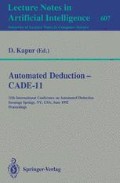Abstract
We exhibit a methodology for formulating and verifying metatheorems about deductive systems in the Elf language, an implementation of the LF Logical Framework with an operational semantics in the spirit of logic programming. It is based on the mechanical verification of properties of transformations between deductions, which relies on type reconstruction and schema-checking. The latter is justified by induction principles for closed LF objects, which can be constructed over a given signature. We illustrate our technique through several examples, the most extensive of which is an interpretation of classical logic in minimal logic through a continuation-passing-style transformation on proofs.
Preview
Unable to display preview. Download preview PDF.
References
Arnon Avron, Furio A. Honsell, and Ian A. Mason. Using typed lambda calculus to implement formal systems on a machine. Technical Report ECS-LFCS-87-31, Laboratory for Foundations of Computer Science, University of Edinburgh, Edinburgh, Scotland, June 1987.
David A. Basin and Robert L. Constable. Metalogical frameworks. Submitted, July 1991.
Alan Bundy, Frank van Harmelen, Alan Smaill, and Andrew Ireland. Extensions to the rippling-out tactic for guiding inductive proofs. In M. E. Stickel, editor, 10th International Conference on Automated Deduction, pages 132–146. Springer-Verlag LNAI 449, 1990.
Rod Burstall and Furio Honsell. Operational semantics in a natural deduction setting. In Gérard Huet and Gordon Plotkin, editors, Logical Frameworks, pages 185–214. Cambridge University Press, 1991.
Dominique Clément, Joëlle Despeyroux, Thierry Despeyroux, and Gilles Kahn. A simple applicative language: Mini-ML. In Proceedings of the 1986 Conference on LISP and Functional Programming, pages 13–27. ACM Press, 1986.
Thierry Coquand and Christine Paulin. Inductively defined types. In P. Martin-Löf and G. Mints, editors, COLOG-88, pages 50–66. Springer-Verlag LNCS 417, December 1988.
Conal M. Elliott. Extensions and Applications of Higher-Order Unification. PhD thesis, School of Computer Science, Carnegie Mellon University, May 1990. Available as Technical Report CMU-CS-90-134.
Steven Fortune, Daniel Leivant, and Michael O'Donnell. The expressiveness of simple and second-order type structures. Journal of the ACM, 30:151–185, 1983.
Laurent Fribourg. Extracting logic programs from proofs that use extended Prolog execution and induction. In David H.D. Warren and Peter Szeredi, editors, Proceedings of the Seventh International Conference on Logic Programming, pages 685–699. MIT Press, June 1990.
Gerhard Gentzen. Untersuchungen über das logische Schließen. Mathematische Zeitschrift, 39:176–210, 405–431, 1935.
Timothy G. Griffin. Logical interpretations as computational simulations. Draft paper. Talk given at the North American Jumelage, AT&T Bell Laboratories, Murray Hill, New Jersey 1991, October 1991.
Lars Hallnäs and Peter Schroeder-Heister. A proof-theoretic approach to logic programming. Journal of Logic and Computation, 1(5):635–660, 1991.
John Hannan and Dale Miller. From operational semantics to abstract machines: Preliminary results. In M. Wand, editor, ACM Conference on Lisp and Functional Programming, pages 323–332. ACM Press, 1990.
John Hannan and Frank Pfenning. Compiler verification in LF. In Seventh Annual IEEE Symposium on Logic in Computer Science, Santa Cruz, California, June 1992. IEEE Computer Society Press. To appear. Preliminary version available as POP Report 91-003, School of Computer Science, Carnegie Mellon University.
Robert Harper. Systems of polymorphic type assignment in LF. Technical Report CMU-CS-90-144, Carnegie Mellon University, Pittsburgh, Pennsylvania, June 1990.
Robert Harper, Furio Honsell, and Gordon Plotkin. A framework for denning logics. Journal of the ACM, To appear. A preliminary version appeared in Symposium on Logic in Computer Science, pages 194–204, June 1987.
Robert Harper and Frank Pfenning. Modularity in the LF logical framework. Submitted. Available as POP Report 91-001, School of Computer Science, Carnegie Mellon University, November 1991.
G. Kahn. Natural semantics. In Proceedings of the Symposium on Theoretical Aspects of Computer Science, pages 22–39. Springer-Verlag LNCS 247, 1987.
Ian A. Mason. Hoare's logic in the LF. Technical Report ECS-LFCS-87-32, Laboratory for Foundations of Computer Science, University of Edinburgh, Edinburgh, Scotland, June 1987.
Spiro Michaylov and Frank Pfenning. Natural semantics and some of its meta-theory in Elf. In Lars Hallnäs, editor, Extensions of Logic Programming. Springer-Verlag LNCS. To appear. A preliminary version is available as Technical Report MPI-I-91-211, Max-Planck-Institute for Computer Science, Saarbrücken, Germany, August 1991.
Frank Pfenning. Elf: A language for logic definition and verified meta-programming. In Fourth Annual Symposium on Logic in Computer Science, pages 313–322. IEEE, June 1989.
Frank Pfenning. An implementation of the Elf core language in Standard ML. Available via ftp over the Internet, September 1991. Send mail to elf-request@cs.cmu.edu for further information.
Frank Pfenning. Logic programming in the LF logical framework. In Gérard Huet and Gordon Plotkin, editors, Logical Frameworks, pages 149–181. Cambridge University Press, 1991.
Frank Pfenning. Unification and anti-unification in the Calculus of Constructions. In Sixth Annual IEEE Symposium on Logic in Computer Science, pages 74–85. IEEE Computer Society Press, July 1991.
G. D. Plotkin. Call-by-name, call-by-value and the λ-calculus. Theoretical Computer Science, 1:125–159, 1975.
Lutz Plümer. Termination Proofs for Logic Programs. Springer-Verlag LNAI 446, 1991.
David Pym. Proofs, Search and Computation in General Logic. PhD thesis, University of Edinburgh, 1990. Available as CST-69-90, also published as ECS-LFCS-90-125.
David Pym and Lincoln Wallen. Investigations into proof-search in a system of firstorder dependent function types. In M.E. Stickel, editor, 10th International Conference on Automated Deduction, Kaiserslautern, Germany, pages 236–250. Springer-Verlag LNCS 449, July 1990.
Author information
Authors and Affiliations
Editor information
Rights and permissions
Copyright information
© 1992 Springer-Verlag Berlin Heidelberg
About this paper
Cite this paper
Pfenning, F., Rohwedder, E. (1992). Implementing the meta-theory of deductive systems. In: Kapur, D. (eds) Automated Deduction—CADE-11. CADE 1992. Lecture Notes in Computer Science, vol 607. Springer, Berlin, Heidelberg. https://doi.org/10.1007/3-540-55602-8_190
Download citation
DOI: https://doi.org/10.1007/3-540-55602-8_190
Published:
Publisher Name: Springer, Berlin, Heidelberg
Print ISBN: 978-3-540-55602-2
Online ISBN: 978-3-540-47252-0
eBook Packages: Springer Book Archive

